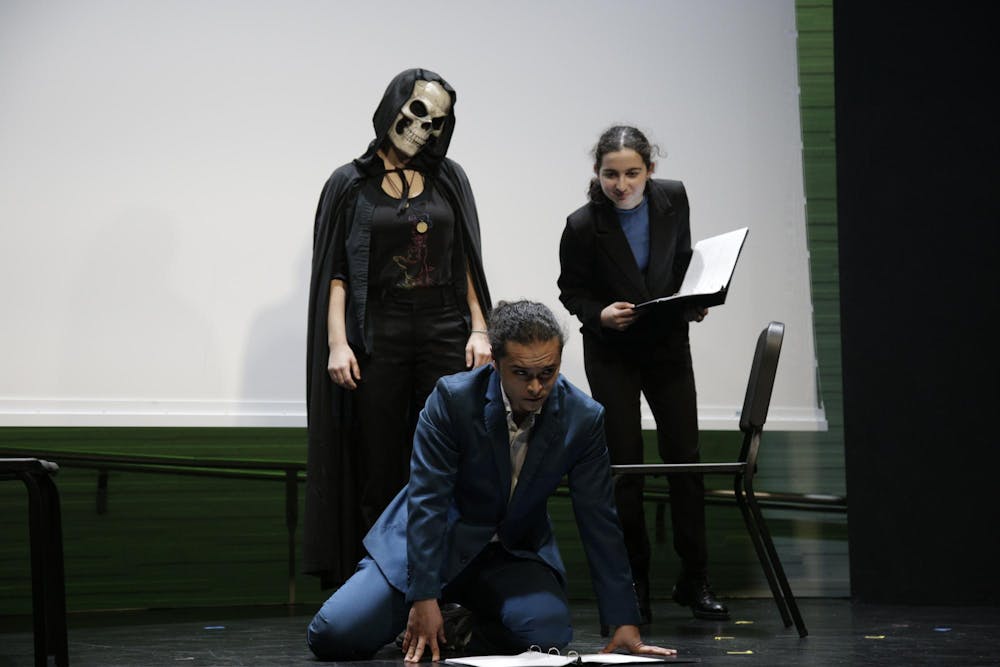At Princeton, “I could be performing for the future president,” Orion Lopez-Ramirez ’26 told me. His play certainly embodies this.
When I arrived at the Lewis Center for the Arts’ Drapkin Studio, I found a long line trailing outside the room. Inside, a buzzing crowd filled the seats. The crowd was excited for “How to Live at the End of the World,” an original show by Lopez-Ramirez that ran from Sept. 26–28.
The show began quite simply: a late-night talk show host — also named Orion, and played by Lopez-Ramirez — hosted the four horsemen of the apocalypse as guests on his show. In the show, the viewers don’t take their appearance seriously — just another bit to drum up publicity, they think. But Orion realizes that they were the real horsemen, and the apocalypse was really coming. This was going to be the end of the world.
Halfway through, Lopez-Ramirez turned to the live audience and lectured for a few minutes.
During the lecture, Lopez-Ramirez left the stage to walk through the studio, roaming up and down the rows among the audience. It was up to the audience to turn their bodies to watch him, an intentional choice that represented the fact that we choose what we listen to and what we don’t, what information we want to hear and what we tune out. The audience watched him carefully, absorbing the weight of the things he spoke about. This was real, not just a performance, and it was our job to hear what he had to say.
The speech focused on the ways we understand violence. It emphasized how violence is not only direct, through wars and bombs, but systemic as well. “Violence can be children going hungry or even a lack of education,” Lopez-Ramirez said.
The lecture also emphasized that the “end of the world” is often conceptualized as the end of the human race, because such a view allows us to remove our responsibility to the future. If we all get wiped out, what’s the point in caring for the world? For one another? It critiqued our culture and its complacency in ignoring the “end of the world” for the sake of our own comfort.
In the show, Orion had to make a choice: Would he tell the audience that this was the end of the world, or would he laugh it off?

Orion, as a talk show host, could make people laugh. He had the power to tell them what was funny or serious, what we could laugh at and what we couldn’t, what we needed to care about and what we didn’t. He didn’t think he had power, but it was shown that he had more power than anyone. Power doesn’t just look like leaders of countries making decisions for the rest of the world, the performance said: Orion could tell people that the appearance of the horsemen was a joke, or he could tell them the truth. The choice was his.
The management at his network told him to go on air and say it was a joke, a bit for publicity. Faced with this moral dilemma, Orion ultimately chose to tell his viewers the truth, but no one believed him. He had the power of influence, but had wielded it in a way that turned himself into a joke that no one believed. Orion made himself into a Cassandra figure — he was right, but no one would believe him until it was too late.
The performance lacked subtlety, but subtlety wasn’t the point. The show touched on many relevant questions about who holds power and how that power is held, the media’s ability to tell us what to think, and our desire to ignore things that bring us discomfort. The show didn’t play with metaphors and symbols: it got straight to the point.
In an interview with The Daily Princetonian, Lopez-Ramirez commented on this choice, saying, “It’s not purely a performance; there’s an educational aspect to it … it gets people in this emotional space where they are receptive to what you’re saying.”

At the end of the show, Orion left a voice note in the lead-up to humanity’s assumed impending collapse. He explained how “we created a world where the only thing that mattered was being on top.” While the live audience never sees the end of the world, they have front row seats to the societal circumstances that lead to its possibility.
This performance lecture tells us what the writer wants us to know and leaves us to do something with it. To this point, Lopez-Ramirez said, “I could be performing to … people who are going to be in positions of power and decision-making in the future, and I feel I had a responsibility to put something in front of them … to leave a lasting impression that makes them do a little bit more good in the future.”
Mackenzie Hollingsworth is a head editor for The Prospect. She is a member of the Class of 2026 and can be reached at mh5273[at]princeton.edu.
Please send any corrections to corrections@dailyprincetonian.com.








